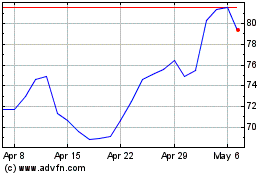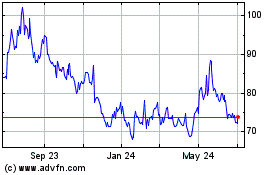By Steven Russolillo
The clobbering tech shares have taken in recent days has
magnified not only how influential these companies have become in
people's everyday lives, but how much sway they've gained in global
stock markets.
The NYSE FANG+ Index--which tracks 10 global tech heavyweights,
including Facebook Inc., Apple Inc. and China's Alibaba Group
Holding--slumped 5.6% on Tuesday, its worst one-day drop since its
inception four years ago.
Investors' concern is that these companies have in recent years
grown so much and so fast that they now have outsize influence on
broader stock indexes, such as the S&P 500 and the Nasdaq
Composite. Their rapid gains have come alongside heavy inflows into
passive funds that track these indexes, leaving millions of
investors susceptible to greater downside should tech stocks
struggle more.
In the U.S., Facebook has been the worst performer among tech
giants, falling 14% this year amid controversy over how it handles
users' data. Chief Executive Mark Zuckerberg expects to testify
before Congress about the company's privacy and data-use standards,
in what would be his first public testimony before lawmakers.
Shares in Apple Inc. and Google parent Alphabet Inc. are also
down for the year, faltering in recent weeks on concerns that tech
firms face tighter regulation. The tech-heavy Nasdaq Composite has
moved at least 2% in four straight trading sessions, the longest
such streak since Oct. 2011-- a contrast from last year, when major
global stock indexes like the Nasdaq were unusually calm.
Up until recently "these...names have been as close as one can
get to a stabilizing force in the market," said Mike O'Rourke,
chief market strategist at U.S. brokerage firm JonesTrading.
As of March 12, Facebook, Amazon.com Inc., Apple, Microsoft
Corp. and Alphabet had accounted for 45% of the S&P 500's
year-to-date gain, he said, indicating just how central they've
become to index moves.
Facebook, Amazon, Netflix Inc. and Alphabet together account for
a 7.8% weighting in the S&P 500, more than double from five
years ago. The overall tech sector now has a 26.8% weight in the
S&P 500, making it by far the largest component. Financial
stocks, in second place, account for 16.8%, according to Thomson
Reuters.
Should big tech stocks falter further, the broader market could
follow suit.
"Due to Facebook's privacy scandal, the techlash theme has been
gaining momentum," Mr. O'Rourke said. "Since consumer privacy data
is the key competitive edge of these companies, it means the level
of risk and uncertainty has risen."
For sure, plenty of investors remain confident tech companies
can maintain strong growth rates.
Nearly 90% of U.S. tech companies beat consensus revenue
estimates in the fourth quarter, noted Toni Sacconaghi, a tech
analyst at Sanford C. Bernstein. That's the best beat rate for any
sector and the highest for tech companies in the past five
years.
And expectations for tech spending growth for 2018 were the
highest in the 14-year history of a Bernstein survey of chief
information officers.
The tech sector's growing clout isn't just a U.S. story. Tech
stocks have become so dominant in emerging markets that for the
first time since 2004, the industry last year overtook finance as
the biggest sector in the MSCI Emerging Markets Index.
Tech had a 28% weighting near the end of 2017, more than double
its level six years ago, according to data provided by MSCI.
Samsung Electronics Co. carries a roughly one-fourth weighting
in South Korea's benchmark Kospi stock index. As the country's
biggest exporter, it has fallen 4.4% this year, largely due to
concerns about heightened global trade tensions.
Asia's most valuable company, Tencent Holdings Ltd., holds
nearly a 10% weighting in Hong Kong's Hang Seng index. It's close
to slipping into the red for the year after disappointing earnings
last week and news that an early shareholder was selling a stake in
the Chinese internet giant. A two-day selloff last week wiped out
$52 billion of the company's market value.
Tencent had more than doubled last year, catapulting its market
value above $500 billion.
The company's sheer size has prompted caution among some
investors. Eric Moffett, a portfolio manager for T. Rowe Price in
Hong Kong, said his fund has owned shares since he started managing
it in 2014.
But the fund has underweighted Tencent for the past six months
due to valuation concerns, he said. He said shares, trading at 40
times projected earnings, look "priced for perfection"--which can
prompt sharp pullbacks, like that seen last week.
Write to Steven Russolillo at steven.russolillo@wsj.com
(END) Dow Jones Newswires
March 28, 2018 06:23 ET (10:23 GMT)
Copyright (c) 2018 Dow Jones & Company, Inc.
Alibaba (NYSE:BABA)
Historical Stock Chart
From Mar 2024 to Apr 2024

Alibaba (NYSE:BABA)
Historical Stock Chart
From Apr 2023 to Apr 2024
